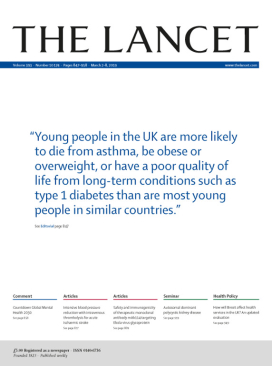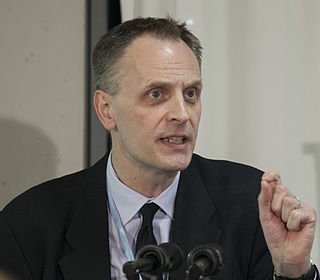Scientific misconduct is the violation of the standard codes of scholarly conduct and ethical behavior in the publication of professional scientific research. It is violation of scientific integrity: violation of the scientific method and of research ethics in science, including in the design, conduct, and reporting of research.

The Lancet is a weekly peer-reviewed general medical journal and one of the oldest of its kind. It is also one of the world's highest-impact academic journals. It was founded in England in 1823.

Richard Charles Horton is editor-in-chief of The Lancet, a United Kingdom–based medical journal. He is an honorary professor at the London School of Hygiene and Tropical Medicine, University College London, and the University of Oslo.
In academic publishing, a retraction is a mechanism by which a published paper in an academic journal is flagged for being seriously flawed to the extent that their results and conclusions can no longer be relied upon. Retracted articles are not removed from the published literature but marked as retracted. In some cases it may be necessary to remove an article from publication, such as when the article is clearly defamatory, violates personal privacy, is the subject of a court order, or might pose a serious health risk to the general public.

Hydroxychloroquine, sold under the brand name Plaquenil among others, is a medication used to prevent and treat malaria in areas where malaria remains sensitive to chloroquine. Other uses include treatment of rheumatoid arthritis, lupus, and porphyria cutanea tarda. It is taken by mouth, often in the form of hydroxychloroquine sulfate.
Jon Sudbø is a Norwegian dentist, physician, and former medical researcher, who was exposed as a scientific fraudster in 2006. Over a period of several years, he fabricated results in the field of oncology which he published in leading medical journals. The article that led to his downfall, which was published in The Lancet, was based on 900 patients Sudbø had fabricated entirely. The editor of The Lancet described this as the biggest scientific fraud conducted by a single researcher ever.
Amit Nilkanth Patel MD, BS, MS is an Indian-American cardiac surgeon and former director of clinical regenerative medicine and tissue engineering at the University of Utah in Salt Lake City. He was a tenured professor of surgery-cardiothoracic at the University of Utah until December 2016.
Paolo Macchiarini is a thoracic surgeon and former regenerative medicine researcher who became known for research fraud and manipulative behavior. He was convicted of research-related crimes in Italy and Sweden.

Didier Raoult is a retired French physician and microbiologist specialising in infectious diseases. He taught about infectious diseases at the Faculty of Medicine of Aix-Marseille University (AMU), and in 1984, created the Rickettsia Unit of the university. From 2008 to 2022, Raoult was the director of the Unité de Recherche sur les Maladies Infectieuses et Tropicales Emergentes. He gained significant worldwide attention during the COVID-19 pandemic for vocally promoting hydroxychloroquine as a treatment for the disease, despite the lack of evidence for its effectiveness and the subsequent opposition from NIH and WHO to its use for the treatment of COVID-19 in hospitalized patients.
Mandeep R. Mehra is The William Harvey Distinguished Chair in Advanced Cardiovascular Medicine and a professor of medicine at Harvard Medical School. He is the medical director of the Brigham Heart and Vascular Center in Boston, Massachusetts, and specializes in advanced heart failure, mechanical circulatory support and cardiac transplantation.
Annarosa Leri is a medical doctor and former associate professor at Harvard University. Along with former professor Piero Anversa, Leri was engaged in biomedical research at Brigham and Women’s Hospital in Boston, an affiliate of Harvard Medical School. Since at least 2003 Anversa and Leri had investigated the ability of the heart to regenerate damaged cells using cardiac stem cells.

Oriol Mitjà i Villar is a Catalan-born Spanish researcher and consultant physician in internal medicine and infectious diseases with expertise in poverty-related tropical diseases. He has conducted research at the Lihir Medical Centre in Papua New Guinea since 2010 on new diagnostic and therapeutic tools to eradicate yaws. He was awarded the Princess of Girona Award in the scientific research category. Currently at the Germans Trias i Pujol Research Institute, Mitjà is conducting research on SARS-CoV-2 coronavirus disease (COVID-19) and strategies to control the infection at a community level.

Drug repositioning is the repurposing of an approved drug for the treatment of a different disease or medical condition than that for which it was originally developed. This is one line of scientific research which is being pursued to develop safe and effective COVID-19 treatments. Other research directions include the development of a COVID-19 vaccine and convalescent plasma transfusion.

The Solidarity trial for treatments is a multinational Phase III-IV clinical trial organized by the World Health Organization (WHO) and partners to compare four untested treatments for hospitalized people with severe COVID-19 illness. The trial was announced 18 March 2020, and as of 6 August 2021, 12,000 patients in 30 countries had been recruited to participate in the trial.
Sapan Sharankishor Desai is an American physician, and the owner of Surgisphere, originally a textbook marketing company that claimed to provide large sets of medical data on COVID-19 patients. This data and the research using it has been discredited, and two papers Desai co-authored that used this data were retracted after being published in prominent medical journals.

The Randomised Evaluation of COVID-19 Therapy is a large-enrollment clinical trial of possible treatments for people in the United Kingdom admitted to hospital with severe COVID-19 infection. The trial was later expanded to Indonesia, Nepal and Vietnam. The trial has tested ten interventions on adults: eight repurposed drugs, one newly developed drug and convalescent plasma.
Sir Martin Jonathan Landray is a British physician, epidemiologist and data scientist who serves as a Professor of Medicine & Epidemiology at the University of Oxford. Landray designs, conducts and analyses large-scale randomised control trials; including practice-changing international trials that have recruited over 100,000 individuals. Landray previously led the health informatics team that enabled the collection and management of data for the UK Biobank on over half a million people.

Chloroquine and hydroxychloroquine are anti-malarial medications also used against some auto-immune diseases. Chloroquine, along with hydroxychloroquine, was an early experimental treatment for COVID-19. Neither drug has been useful to prevent or treat SARS-CoV-2 infection. Administration of chloroquine or hydroxychloroquine to COVID-19 patients has been associated with increased mortality and adverse effects, such as QT prolongation. Researchers estimate that off-label use of hydroxychloroquine in hospitals during the first phase of the pandemic caused 17,000 deaths worldwide. The widespread administration of chloroquine or hydroxychloroquine, either as monotherapies or in conjunction with azithromycin, has been associated with deleterious outcomes, including QT interval prolongation. As of 2024, scientific evidence does not substantiate the efficacy of hydroxychloroquine, with or without the addition of azithromycin, in the therapeutic management of COVID-19.
The Front Line COVID-19 Critical Care Alliance (FLCCC) is a group of physicians and former journalists formed in April 2020 that has advocated for various unapproved, dubious, and ineffective treatments for COVID-19. Their website spoke favorably about the injections, saying Ivermectin should not replace, but "be thought of as complementary bridge to vaccination until the vaccines are made available to all those in need." The group is led by Paul E. Marik and Pierre Kory. Both would later join conservative or right-wing groups promoting COVID-19 vaccine hesitancy and misinformation.






